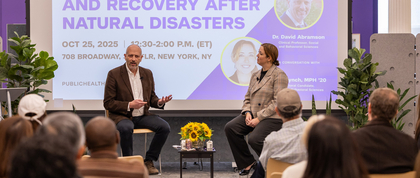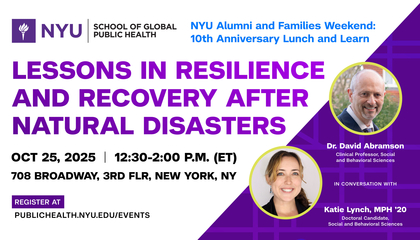
Twenty years after Hurricane Katrina, what have we learned about the long-term impacts of natural disasters on our communities? NYU GPH explored this question during a lecture hosted as part of the 2025 NYU Alumni and Families Weekend. The session featured Dr. David Abramson and Katie Lynch, MPH '20, a GPH alum and current doctoral candidate, who highlighted their work at the Center for Public Health Disaster Science.
Dr. Abramson shared insights from the Gulf Coast Child and Family Health Study, a 13-year cohort of Katrina survivors. The study began with rapid fieldwork, including the Life Story Project, which revealed that major losses for survivors were relational—the loss of relationships, community, and sense of self, not just material things. The research showed that subjective recovery often differs from objective recovery, and people followed one of four recovery paths: resistant, resilient, long-term recovery, or chronically dysfunctional. Recognizing that children often hide their distress from parents, the Center developed the Shoreline intervention to build skills, hope, opportunity, and resilience through engagement in high school students.
Katie's current research continues this work by examining the effects of recurrent wildfires and smoke events in California, emphasizing that resilience varies across the life course and that recovery is a complex process driven by people's ability to maintain their economic, human, social, and political capital.
